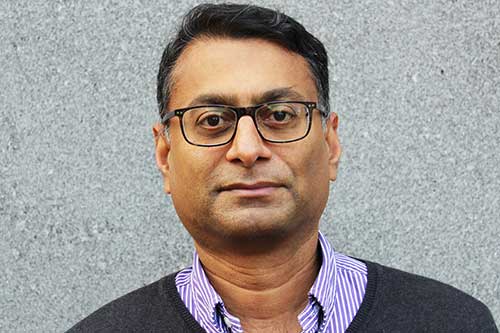Professor Muttukrishnan Rajarajan, the Institute’s Director, shares insights into fintech’s challenges and opportunities.
By Mr John Stevenson (Senior Communications Officer), Published
On December 15th and 16th 2022, City, University of London’s Institute for Cyber Security (ICS) will host its International Conference on Financial Technology in association with the Worshipful Company of Information Technologists and the Institute of the Future at the University of Nicosia (Cyprus).
The conference comes amidst the rapid transformation taking place across the global financial services industry. The changes in the fortunes of the industry have indeed been hastened by developments in digital banking, wealth management, regtech, digital payments and insuretech. The Covid-19 pandemic has also spurred the growth of digital applications and platforms for the industry.
All of these advancements will be discussed at the conference, which brings together leading UK banking, technology and fintech companies – who will also have the opportunity to showcase their product and service offerings.
 Ahead of the conference, Professor of Security Engineering and Director of City’s ICS, Professor Muttukrishnan Rajarajan, shares his perspectives on fintech and its possibilities with City News.
Ahead of the conference, Professor of Security Engineering and Director of City’s ICS, Professor Muttukrishnan Rajarajan, shares his perspectives on fintech and its possibilities with City News.
City News: What is fintech and why has the Institute for Cyber Security taken on the challenge of hosting the conference?
Professor Muttukrishnan Rajarajan: Financial technology is an emerging area within the financial services sector, where data is shared with third parties to provide more personalised and automated services to benefit the end customer. This permits new and innovative players to come into the marketplace to disrupt the way the banking sector has traditionally operated and therefore poses a direct threat to high street banks. City, University of London has long-standing ties with the Corporation of London. The recent Khalifa Report highlights the importance of London as the fintech hub of the world. As a consequence, it is important for The City of London to take the lead in establishing a strong industry with academic partnerships to accelerate and grow this area.
CN: Can you tell our readers about some of the speakers you have selected for the conference and why attendees will find it valuable to hear them speak?
PMR: They have been hand-picked by me due to their interesting backgrounds and the innovation they have demonstrated in the fintech area. In addition, the panels will bring together some of the ‘best in class’ panellists to discuss some of the future challenges in fintech ranging from managing identity in the metaverse for investment, to quantum computers for big financial data mining for faster real-time payment processing.
CN: How long has City been involved in cyber security research and what is the main aim of the Institute for Cyber Security?
PMR: The cyber security work at City started in 2000. Since then, the landscape has changed and cyber science has become much more interdisciplinary today. To address this need a new interdisciplinary institute was founded in 2018 to bring together computer scientists, legal experts, engineers and psychologists to take a 360-degree view of cyber security. The main aim of the institute is to become the go-to hub for London SMEs to address any of their cyber security challenges. To achieve this aim, the institute has recently partnered with the London Cyber Resilience Centre.
CN: What are some of the key regulatory issues which fintech must grapple with from your vantage point as a cybersecurity specialist?
PMR: Cross border financial transactions are always a challenge due to money laundering and terrorist financing. Regulating crypto currencies has been a particular challenge for the UK. There are also many new regulatory challenges that are coming in the near future including DORA and SS1/SS2. Fintech companies have to start working towards achieving better security compliance through certification and strategic planning to address some of the new regulatory challenges that the financial services industry will encounter soon.
CN: How has the Institute of Cyber Security helped the UK financial sector in gaining an awareness of online dangers to consumers?
PMR: The Institute works closely with many organisations to promote the cyber hygiene that is essential for any organisation to effectively shield itself against cyber-attacks. I have been leading cyber security training through a programme called Recover & Grow where I advise Chief Executive Officers, Chief Technical Officers and Chief Operating Officers about the importance of Cyber Essentials and international standards like ISO 27001, so as to safeguard against cyber attacks and develop strategies to future-proof these highly vulnerable entities.
